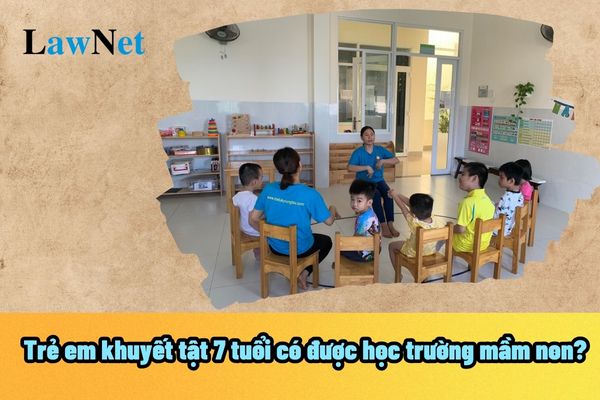Vietnam: Can 7-year-old children with disabilities attend kindergarten? How are children divided into groups from 3 to 26 months old?
Are 7-year-old disabled children allowed to attend kindergarten?
Pursuant to Article 32 of the Charter of Preschools issued together with Circular 52/2020/TT-BGDDT of the Ministry of Education and Training of Vietnam, age and health of preschool children are prescribed as follows:
Age and health of preschool children
1. Children from 3 months old to 6 years old are eligible for preschools.
2. Children with disabilities may attend school 3 years later than normal children.
According to the above regulation, disabled children can attend kindergarten up to the age of 9, which is 3 years older than the general regulation.
Therefore, a 7-year-old disabled child is completely allowed to attend kindergarten.

Are 7-year-old disabled children allowed to attend kindergarten? Division groups for children from 3 to 26 months old? (Image from the Internet)
How are children from 03 months old to 36 months old divided in kindergarten?
Pursuant to Clause 1, Article 15 of the Charter of Preschools issued together with Circular 52/2020/TT-BGDDT:
Junior and senior classes
1. Children are sorted into junior and senior classes.
a) Children from 3 months old to 36 months old will be sorted into junior classes. The maximum number of children in a junior class is regulated as follows:
- A junior class for children from 3 months old to 12 months old: 15 children;
- A junior class for children from 13 months old to 24 months old: 20 children;
- A junior class for children from 25 months old to 36 months old: 25 children;
b) Children from 3 to 6 years old will be sorted into senior classes. The maximum number of children in a senior class is regulated as follows:
- A senior class for children from 3 to 4 years old: 25 children;
- A senior class for children from 4 to 5 years old: 30 children;
- A senior class for children from 5 to 6 years old: 35 children;
2. If the number of children in each class is less than 50% of the maximum number prescribed in Points a and b Clause 1 of this Article, it is permissible to organize a combined class with not more than 20 children per junior class and 30 children per senior class.
3. Each class must have less than 2 children with disabilities who are attending inclusive education programs.
4. Each class must have sufficient teachers as per regulation.
5. Preschools may have branches in different areas to facilitate children to go to school. Each branch is under the management of the principal or the vice-principal will be assigned to manage such branch.
According to the above regulation, children's groups: children from 03 months old to 36 months old are organized into groups. The maximum number of children in each group is regulated as follows:
- Group for children from 03 to 12 months old: 15 children;
- Group for children from 13 to 24 months old: 20 children;
- Group for children from 25 to 36 months old: 25 children;
Therefore, children from 03 months old to 36 months old in kindergarten will be divided into 3 groups according to the age groups specified.
What is the relationship between parents and the kindergarten?
Pursuant to Article 36 of the Charter of Preschools issued together with Circular 52/2020/TT-BGDDT, the relationship between the school, families, and society is as follows:
- The relationship between the school, families, and society is meant to ensure consensus in perception as well as in activities of nurturing, caring, and educating; diversify resources to construct preschool educational institutions, ensuring the best educational environment for each child. The educational cooperation between the school, families, and society shall ensure principles of proactiveness, responsible community, democracy, equality, cooperation, and sharing.
- The school shall proactively consult and propose the scale development and physical facility construction to the authority; organize activities of nurturing, caring, and educating. Disclose plans and results of nurturing, caring, and educating of the school and cooperation activities with parents of children; disseminate scientific knowledge about raising children for parents of children and the community; conduct children’s disease prevention and health examinations in the school.
- Families shall proactively cooperate with the school in nurturing, caring, and educating children at home. Volunteer to contribute knowledge, effort, and materials to enhance the physical facility and actively participate in activities of the school; exercise the right of supervision for effective use of resources.
- The school shall effectively mobilize and use resources of the community and parents of children, ensuring the principle of publicity, democracy, and rights of supervision of contributors as per regulation.
- The school shall proactively propose assistance and acquire positive feedback of parents of children and the community about activities of nurturing, caring, and educating children of the school; pay attention to and assist families with difficult circumstances and mobilize and facilitate children to go to school.
- The community and parents of children shall assist and supervise the school implementing activities; provide feedback for the school on activities of nurturing, caring, and educating children, activities of building a safe and friendly educational environment, and activities of improving the quality of children's nurture, care, and education.

